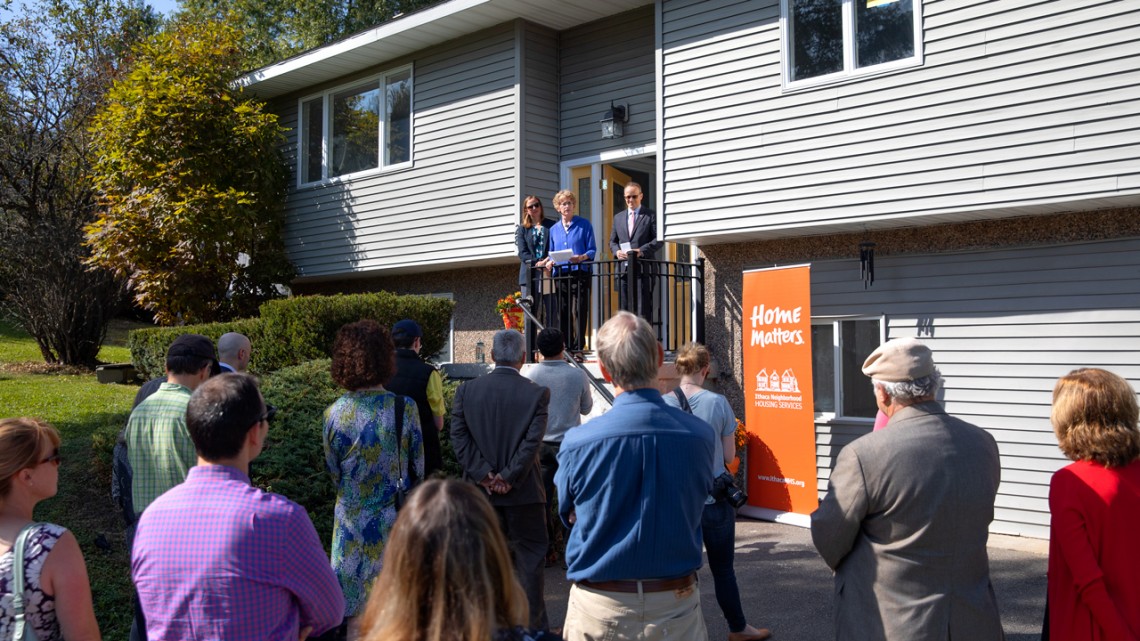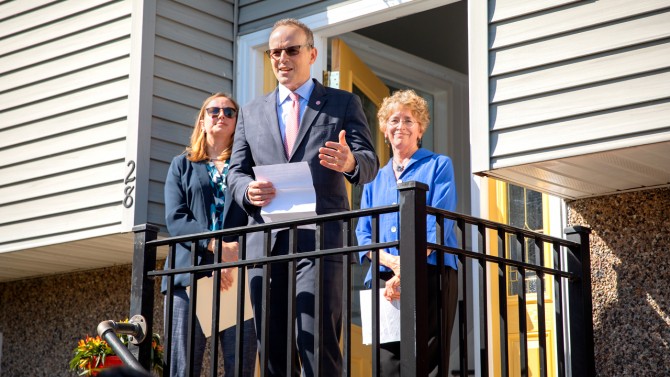
Cornell, Tompkins County and Ithaca Neighborhood Housing Services officials announce new funding for the Community Housing Development Fund at a renovated house in Dryden, New York.
Cornell extends support for county affordable housing
By Krishna Ramanujan
Cornell University has pledged continued support of the Community Housing Development Fund, a joint effort of Tompkins County, the city of Ithaca and Cornell that is designed to help communities and organizations throughout Tompkins County meet the affordable-housing needs of the county’s residents.
To this end, Cornell announced Sept. 20 that it will contribute a one-time supplement of $200,000 to the affordable housing fund to help meet unmet demand for its resources. This supplement will be in addition to the remaining $200,000 annually for the next two years that was part of a 2015 six-year extension.
Additionally, Cornell has agreed to extend funding for another six years after 2021 by committing another $1.2 million ($200,000 annually) through 2027.
“It’s a great, great example of community-campus collaboration,” Joel Malina, vice president for university relations, said at an event to announce the new funding Sept. 20 in Dryden.
The Community Housing Development Fund, formerly referred to as the Housing Fund, began in 2009 with six years of funding and was extended for another six years in 2015 through 2021. At the time of the extension, Cornell agreed to contribute $1.2 million ($200,000 annually) over the six-year period, the county pledged $600,000 ($100,000 annually), and the city added $100,000 for the first year of the extended program.
“It’s a privilege, frankly, for Cornell University to work with Tompkins County and the city of Ithaca on this landmark initiative that works to ensure that newly constructed or rehabilitated housing units remain affordable to successive buyers or renters,” Malina said. “The three entities came together with a commitment, and the program exceeded expectations. We’re happy to provide this. We’ve demonstrated the success of the program.”
The extension will bring Cornell’s total investment in the Community Housing Development Fund, from 2009 through 2027, to $3.8 million.
Due to timing of budget cycles, county officials have submitted a proposal to the legislature to include future funds to the housing fund in its budget beyond 2021, said Martha Robertson ’75, chair of the Tompkins County Legislature.
A request to the city of Ithaca and Mayor Svante Myrick ’09 has also been made to consider future funding.
“It takes a village to create affordable housing,” Roberston said. “It takes a lot of entities to create these kinds of opportunities for our community. No one entity does it alone. We’re so fortunate to have the partnership of our largest employer, Cornell University, together with the city of Ithaca in creating the Community Housing Development Fund.”
The fund and related programs have supported construction or rehabilitation of 491 units across Tompkins County with nearly $4 million in awards over the last 10 years, Robertson said. Those funds have in turn leveraged an additional $114 million in outside funds, she added.
Along with Malina and Robertson, Johanna Anderson, executive director of the Ithaca Neighborhood Housing Services (INHS)– founded in 1976 to revitalize neighborhoods and assist people with low to moderate income in obtaining housing – also spoke at the event.
INHS alone has received more than $2.1 million from the Community Housing Development Fund since 2009, and has leveraged that funding, Anderson said, into more than $100 million of additional funding from New York state, private investors and financial institutions for affordable housing.
Media Contact
Get Cornell news delivered right to your inbox.
Subscribe


